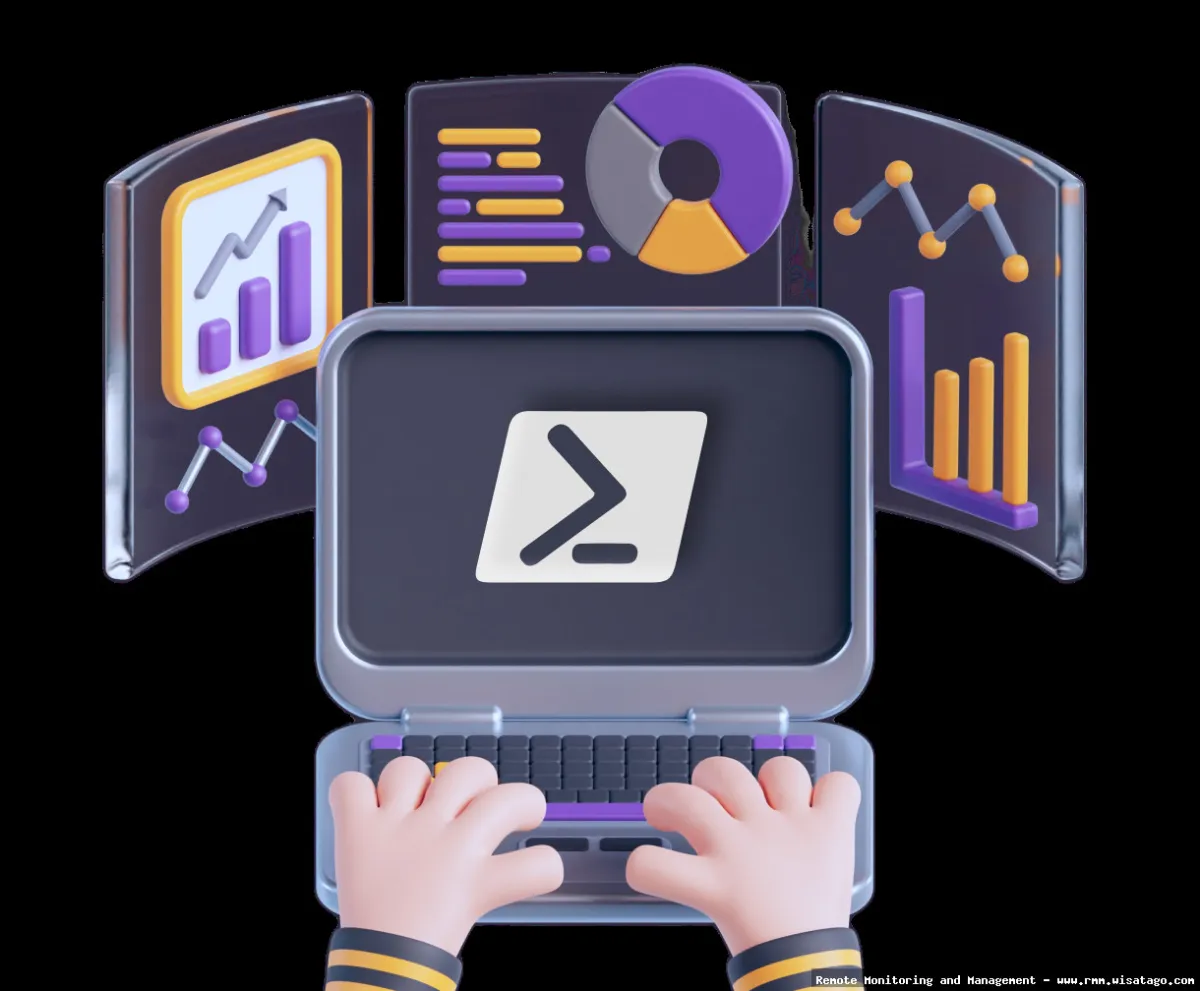In today’s fast-paced IT environment, managing and maintaining a distributed network of devices can feel like herding cats. The sheer volume of endpoints, the diversity of operating systems, and the constant threat of security vulnerabilities create a complex challenge. That’s where Remote Monitoring and Management (RMM) platforms come into play, offering a centralized solution for IT professionals to remotely monitor, manage, and support their infrastructure. But RMMs are more than just monitoring tools; their true power lies in their ability to automate tasks and remediate issues through scripting, and this is where the advanced script library becomes a critical component.
Think of an advanced script library as a pre-built toolbox filled with ready-to-use scripts designed to tackle common IT tasks. Instead of manually configuring each device or writing scripts from scratch every time a problem arises, you can leverage this library to quickly deploy solutions across your entire network. This not only saves time and reduces the risk of human error but also enables proactive management and faster incident resolution. The quality and comprehensiveness of an RMM‘s script library can be a major differentiator between platforms, impacting efficiency and overall IT service delivery.

This article delves into the world of advanced script libraries in professional RMM platforms, exploring their key features, benefits, and how they empower IT professionals to streamline their operations, enhance security, and deliver exceptional service. We’ll cover everything from the types of scripts typically found in these libraries to best practices for implementation and customization. Whether you’re a seasoned RMM user or just starting to explore the possibilities, this guide will provide valuable insights into maximizing the potential of scripting in your IT management strategy.
What is an Advanced Script Library in an RMM Platform?
At its core, an advanced script library is a repository of pre-written scripts designed to automate various IT tasks within an RMM platform. These scripts can be written in various scripting languages such as PowerShell, Bash, Python, or even proprietary languages specific to the RMM vendor. The library is typically organized by category, making it easy to find the right script for a particular purpose. Think of it as a curated collection of automation solutions, ready to be deployed at a moment’s notice.
Key Components of a Script Library
A well-designed script library typically includes the following key components:
- Categorization: Scripts are organized into logical categories based on their function (e.g., patching, security, software deployment, hardware inventory).
- Search Functionality: Robust search capabilities allow users to quickly find scripts based on keywords, descriptions, or script names.
- Script Descriptions: Each script includes a detailed description of its purpose, parameters, and expected output.
- Parameterization: Scripts are often parameterized, allowing users to customize their behavior without modifying the underlying code.
- Version Control: A version control system tracks changes to scripts, allowing users to revert to previous versions if necessary.
- Community Contributions: Some RMM platforms allow users to contribute their own scripts to the library, fostering a collaborative environment.
Types of Scripts Found in a Typical Library
The scripts within an advanced library cover a wide range of IT management tasks, including:
- Patch Management: Scripts for deploying operating system and application patches, ensuring systems are up-to-date and secure.
- Software Deployment: Scripts for installing, uninstalling, and updating software applications on remote devices.
- Security Auditing: Scripts for scanning systems for vulnerabilities, identifying misconfigurations, and enforcing security policies.
- Hardware Inventory: Scripts for collecting hardware information, such as CPU type, memory size, and disk space.
- Performance Monitoring: Scripts for monitoring system performance metrics, such as CPU utilization, memory usage, and disk I/O.
- User Management: Scripts for creating, modifying, and deleting user accounts.
- Network Configuration: Scripts for configuring network settings, such as IP addresses, DNS servers, and routing tables.
- System Maintenance: Scripts for performing routine system maintenance tasks, such as disk cleanup and defragmentation.
Benefits of Using an Advanced Script Library
Leveraging an advanced script library within your RMM platform offers a multitude of benefits, ultimately leading to increased efficiency, reduced costs, and improved IT service delivery.
Increased Efficiency and Automation
Perhaps the most significant benefit is the ability to automate repetitive tasks. Instead of manually configuring each device or responding to incidents one by one, you can deploy scripts to handle these tasks automatically. This frees up IT staff to focus on more strategic initiatives, such as planning for future growth or improving security posture.

Reduced Costs and Improved ROI
By automating tasks and reducing the need for manual intervention, an advanced script library can significantly reduce IT costs. This includes savings on labor, travel expenses, and downtime. Moreover, by improving the efficiency of IT operations, the script library can help you get the most out of your RMM investment, maximizing your return on investment (ROI).
Improved Security Posture
Security is a top priority for any IT organization, and an advanced script library can play a crucial role in improving your security posture. Scripts can be used to automatically patch systems, scan for vulnerabilities, enforce security policies, and respond to security incidents. This proactive approach to security helps to minimize the risk of breaches and data loss.
Faster Incident Resolution
When incidents occur, time is of the essence. An advanced script library can help you resolve incidents faster by providing pre-built scripts for common troubleshooting tasks. This reduces downtime and minimizes the impact on business operations. For example, a script could automatically restart a service that has crashed or clear a full disk drive.
Enhanced Standardization and Consistency
Using scripts ensures that tasks are performed consistently across all devices in your network. This eliminates the risk of human error and helps to maintain a standardized environment. Standardized environments are easier to manage, troubleshoot, and secure.
Challenges and Considerations
While an advanced script library offers numerous benefits, there are also some challenges and considerations to keep in mind when implementing and using it.
Script Security and Integrity
It’s crucial to ensure that the scripts in your library are secure and trustworthy. Malicious or poorly written scripts can cause significant damage to your systems. Therefore, it’s important to implement a process for vetting and testing scripts before deploying them to production environments. This may involve code reviews, security scans, and thorough testing in a non-production environment.

Script Maintenance and Updates
Scripts are not static; they need to be maintained and updated to reflect changes in the environment, such as new software versions or security vulnerabilities. It’s important to establish a process for regularly reviewing and updating scripts to ensure they remain effective and relevant.
Script Compatibility and Dependencies
Scripts may have dependencies on specific software versions or operating systems. It’s important to ensure that your scripts are compatible with the target environment and that all necessary dependencies are installed. Thorough testing is essential to identify and resolve any compatibility issues.
Proper Training and Documentation
To effectively use an advanced script library, IT staff need to be properly trained on how to find, customize, and deploy scripts. Comprehensive documentation is also essential to provide guidance on script usage and troubleshooting. Without adequate training and documentation, the script library may not be fully utilized, and its potential benefits may not be realized.
Customization vs. Pre-Built Scripts
While pre-built scripts offer convenience, they may not always perfectly fit your specific needs. You may need to customize scripts to adapt them to your unique environment. However, customizing scripts can introduce complexity and increase the risk of errors. It’s important to carefully weigh the benefits of customization against the potential risks.
Best Practices for Implementing and Using a Script Library
To maximize the benefits of an advanced script library, it’s important to follow these best practices:
Establish a Scripting Policy
Define clear guidelines for script development, testing, and deployment. This policy should address issues such as script security, version control, and documentation.

Implement a Testing Process
Thoroughly test all scripts in a non-production environment before deploying them to production. This helps to identify and resolve any errors or compatibility issues.
Use Version Control
Implement a version control system to track changes to scripts and allow you to revert to previous versions if necessary. This is especially important for custom scripts. Effective IT management often involves proactive monitoring and maintenance, and RMM plays a crucial role in achieving this.
.
Document Everything
Create detailed documentation for each script, including its purpose, parameters, and expected output. This makes it easier for others to understand and use the script.
Regularly Review and Update Scripts
Periodically review and update scripts to ensure they remain effective and relevant. This includes updating scripts to reflect changes in the environment, such as new software versions or security vulnerabilities.
Monitor Script Execution
Monitor the execution of scripts to ensure they are running correctly and to identify any errors or failures. Many RMM platforms offer built-in monitoring tools for this purpose.
Leverage Community Resources
Take advantage of community forums and online resources to learn from other RMM users and share your own experiences. Many RMM vendors also offer community script libraries where users can contribute and download scripts.

Conclusion
An advanced script library is an invaluable asset for any IT professional using an RMM platform. By automating tasks, improving security, and streamlining operations, it can significantly enhance efficiency, reduce costs, and improve IT service delivery. However, it’s important to approach script library implementation with a well-defined strategy, considering security, maintenance, and training. By following the best practices outlined in this guide, you can unlock the full potential of scripting and transform your IT management capabilities.
Ultimately, the effectiveness of an advanced script library hinges on its integration with the RMM platform and the ease with which IT professionals can access, customize, and deploy scripts. Selecting an RMM platform with a robust and well-maintained script library is a critical decision that can have a lasting impact on your IT operations. As the IT landscape continues to evolve, the ability to automate tasks and proactively manage systems through scripting will become increasingly important for staying ahead of the curve and delivering exceptional IT services. Many businesses are seeking effective strategies, and understanding what makes Profitable Rmm Solutions truly beneficial is key to long-term success
Conclusion
In conclusion, the integration of an advanced script library within professional RMM platforms represents a significant evolution in IT management capabilities. As we’ve explored, these libraries empower IT professionals to automate complex tasks, standardize processes across diverse environments, and proactively address potential issues before they escalate. The ability to leverage pre-built, tested scripts, alongside the flexibility to customize and share them, drastically reduces manual effort, minimizes errors, and ultimately enhances the efficiency and effectiveness of IT operations. This translates directly into improved service delivery, reduced downtime, and a stronger overall IT posture for the organizations that embrace this technology.
The advantages of utilizing an advanced script library are undeniable, offering a pathway to greater automation, enhanced security, and improved scalability. We encourage IT professionals to carefully evaluate their current RMM platform and explore the possibilities offered by a robust scripting environment. By embracing the power of automation through scripting, you can unlock significant benefits for your organization and position yourself for success in the ever-evolving landscape of IT management. Ready to experience the difference? Explore leading RMM platforms with advanced scripting capabilities and discover how they can transform your IT operations today. Visit our website to learn more.
Frequently Asked Questions (FAQ) about Advanced Script Library in Professional RMM Platforms
How can I leverage an advanced script library within my professional RMM platform to automate complex IT tasks and improve efficiency?
An advanced script library in a professional RMM (Remote Monitoring and Management) platform is a powerful tool for automating repetitive and complex IT tasks, significantly boosting efficiency. You can leverage it by first understanding the library’s contents and organization. Most RMM platforms categorize scripts by function (e.g., patching, security, performance monitoring). Then, identify tasks consuming the most time or resources. For example, automating software updates across all endpoints. Use pre-built scripts from the library as a starting point and customize them to fit your specific needs. Regularly updating and testing these scripts is crucial to ensure they remain effective and don’t introduce unintended consequences. Finally, document the purpose and function of each script for future reference and troubleshooting. This proactive approach will dramatically reduce manual effort and improve your overall IT service delivery.
What are the key security considerations when using and managing an advanced script library within a Remote Monitoring and Management (RMM) system, and how can I mitigate potential risks?
Security is paramount when dealing with an advanced script library in an RMM system. Malicious or poorly written scripts can compromise entire networks. Key considerations include restricting access to the script library using role-based access control (RBAC). Only authorized personnel should be able to create, modify, or execute scripts. Implement rigorous script review and approval processes before deployment to catch potential vulnerabilities or unintended consequences. Utilize digital signatures to verify the authenticity and integrity of scripts, ensuring they haven’t been tampered with. Regularly scan the script library for known vulnerabilities using security tools and keep the RMM platform itself updated with the latest security patches. Monitor script execution logs for unusual activity that could indicate a security breach or misconfiguration. By implementing these measures, you can significantly reduce the risk associated with using and managing an advanced script library.
How do I effectively troubleshoot errors and debug scripts within the advanced script library of my RMM platform to minimize downtime and ensure reliable automation?
Troubleshooting script errors within an RMM platform’s advanced script library requires a systematic approach. Start by examining the RMM platform’s logs for detailed error messages and stack traces. These logs often pinpoint the line of code causing the issue. Use the RMM platform’s built-in debugging tools, if available, to step through the script execution and inspect variable values. Implement robust error handling within your scripts using try-catch blocks to gracefully handle unexpected errors and prevent script termination. Test scripts thoroughly in a sandbox or test environment before deploying them to production to identify and resolve issues early on. Consult the RMM platform’s documentation and community forums for solutions to common scripting errors. Finally, maintain version control of your scripts, allowing you to easily revert to a previous working version if necessary. This combination of proactive testing, error handling, and systematic troubleshooting will minimize downtime and ensure reliable automation.